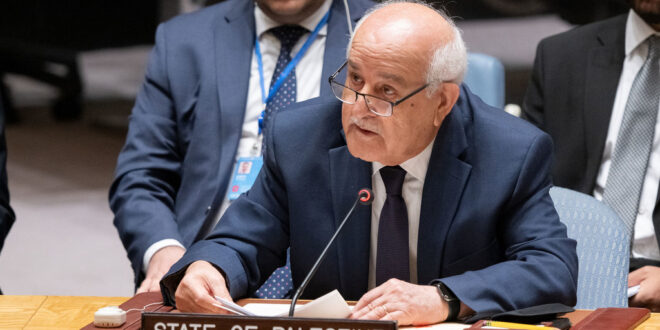UN Security Council discusses Israeli settlement expansion amid rising tensions..Palestine calls for action against Israeli violations
The United Nations Security Council convened yesterday to discuss the implementation of Resolution 2334 (2016), which calls for an immediate and complete halt to all settlement activities by Israel in the occupied Palestinian territories, WAFA News Agency reported.
Riyad Mansour, the Permanent Representative of the State of Palestine to the United Nations, condemned Israel for disregarding UN Security Council Resolution 2334, stating that it has violated its provisions just as it has done with other resolutions. He emphasized that Israel’s actions contravene fundamental principles of international law and UN decisions.
Mansour noted the International Court of Justice’s advisory opinion, which concluded that Israel’s continued presence in the occupied Palestinian territories is illegal. He also noted the recent UN General Assembly resolution demanding an end to the Israeli occupation of Palestine, describing it as a historic manifestation of collective will to act.
“We intend to pursue every aspect of this resolution and respond without delay to any failures in compliance,” he stated. He commended the International Court of Justice and the General Assembly for rising to the historical and tragic challenge faced by the Palestinian people.
Expressing deep concern over the ongoing humanitarian crisis in Gaza, Mansour said, “Gaza does not need more words; it needs more actions.”
He highlighted the Security Council’s role in upholding international law, urging it not to bend the law to accommodate Israeli violations or sacrifice the UN Charter to please Israel.
Mansour reaffirmed that the Palestinian people aspire to live normal lives and will settle for nothing less.
Mansour reiterated calls for Israel to immediately cease all settlement activities in the occupied territories and to fully respect its legal obligations in this regard.
Tor Wennesland, the UN Special Coordinator for the Middle East Peace Process, emphasized that Israel’s establishment of settlements in the occupied Palestinian territories, including East Al-Quds (Jerusalem), lacks legal legitimacy and constitutes a blatant violation of international law.
He reported that settlement activity continues unabated, with new units being approved while violence persists in Gaza and daily confrontations are reported in the West Bank.
Wennesland indicated that approximately 6,370 new settlement units have been approved, alongside ongoing demolitions and seizures of Palestinian-owned buildings throughout the West Bank. He highlighted the forced displacement of 188 Palestinians, including 111 children, from their homes in the West Bank, driven by violence and harassment from settlers.
In his remarks, Wennesland condemned the widespread killing and injuring of civilians in Gaza, including women and children, and reiterated that nothing justifies collective punishment against the Palestinian population. He expressed grave concerns over potential serious violations of international humanitarian law.
To address the urgent humanitarian needs and improve dire conditions for civilians, Wennesland urged Israel to fully open all crossings to Gaza and facilitate the immediate and unrestricted delivery of humanitarian aid to Palestinian civilians.
He called for a ceasefire to end the humanitarian suffering and emphasized the need for intensified efforts toward an agreement that includes an immediate cessation of hostilities and the unconditional release of all hostages.
Wennesland strongly condemned all acts of violence against civilians and expressed deep concern over the escalation of violence in the occupied West Bank, particularly in East Al-Quds.
He referred to the repeated Israeli incursions into Palestinian refugee camps, which have resulted in casualties and significant damage to infrastructure, along with a rising number of detention, including administrative detentions since October 7.
He also denounced attacks by Israeli settlers against Palestinians, often occurring in proximity to Israeli forces, which involves the use of weapons distributed by the Israeli occupation government.
Edited by Amal Farhat

